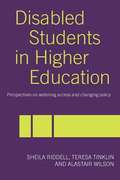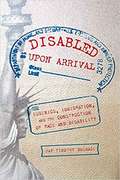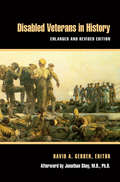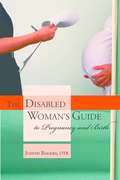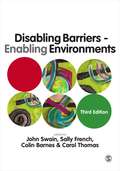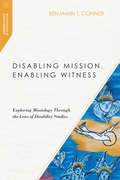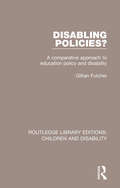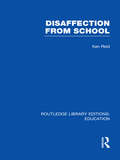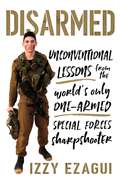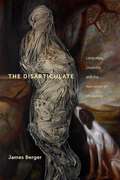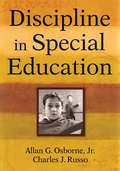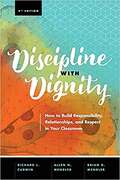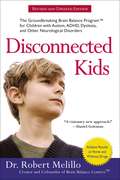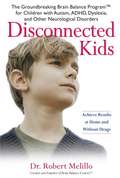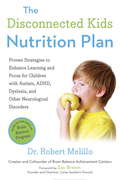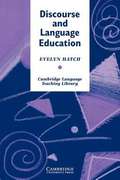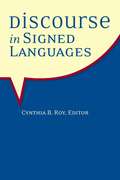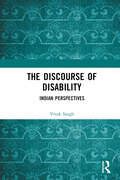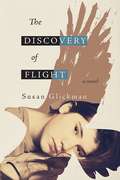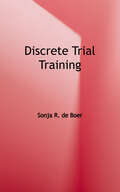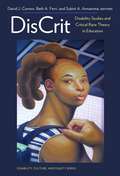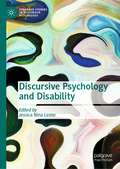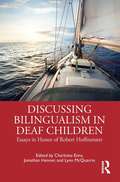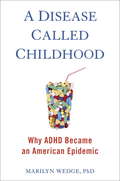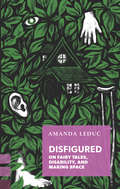- Table View
- List View
Disabled Students in Higher Education: Perspectives on Widening Access and Changing Policy
by Sheila Riddell Teresa Tinklin Alastair WilsonThe authors present results gleaned from eight higher education institutions in Great Britain which demonstrate the level of participation by disabled students.
Disabled Upon Arrival: Eugenics, Immigration, And The Construction Of Race And Disability
by Jay Timothy DolmageIn North America, immigration has never been about immigration. That was true in the early twentieth century when anti-immigrant rhetoric led to draconian crackdowns on the movement of bodies, and it is true today as new measures seek to construct migrants as dangerous and undesirable. This premise forms the crux of Jay Timothy Dolmage’s new book Disabled Upon Arrival: Eugenics, Immigration, and the Construction of Race and Disability, a compelling examination of the spaces, technologies, and discourses of immigration restriction during the peak period of North American immigration in the early twentieth century. Through careful archival research and consideration of the larger ideologies of racialization and xenophobia, Disabled Upon Arrival links anti-immigration rhetoric to eugenics—the flawed “science” of controlling human population based on racist and ableist ideas about bodily values. Dolmage casts an enlightening perspective on immigration restriction, showing how eugenic ideas about the value of bodies have never really gone away and revealing how such ideas and attitudes continue to cast groups and individuals as disabled upon arrival.
Disabled Veterans in History
by David A. GerberDisabled Veterans in History explores the long-neglected history of those who have sustained lasting injuries or chronic illnesses while serving in uniform. The contributors to this volume cover an impressive range of countries in Europe and North America as well as a wide sweep of chronology from the Ancient World to the present. The essays address the emergence of "veteran" as a political category with unique privileges and entitlements and of disabled veterans as a special project--and indeed one of the original projects--of the modern welfare state. The introductory essay, "Finding Disabled Veterans in History," offers perhaps the first attempt at synthesizing knowledge about disabled veterans in Western societies. The other essays examine the representation of disabled veterans from Sophocles Philoctetes to American feature films; the relations of disabled veterans to the state and society in such public policy issues as pensions, medical care, physical rehabilitation, and job retraining; and the disabled veteran's agency and experience in reentering the peacetime world. Other topics include the place of disabled veterans in societies defeated in war; the fate of disabled veterans in societies experiencing frequent changes of political regimes; the emergence of pensions and vocational rehabilitation for disabled veterans; and the abiding problem of alcohol abuse among disabled veterans. The contributors come from a variety of disciplines, including history, physical rehabilitation, Slavic studies, sociology, communication and media, and museum studies. The book will be of interest especially to researchers in the fields of war and society, the welfare state, and disability studies, as well as those in the medical, rehabilitation, and counseling fields.
The Disabled Woman's Guide to Pregnancy and Birth
by Judith RogersThe Disabled Woman's Guide to Pregnancy and Birth is a comprehensive and useful guide that is based on the experiences of women with disabilities who chose to have children. Thoroughly researched and informative, this book is a practical guide for both disabled women planning for pregnancy, and the health professionals who work with them.
Disabling Barriers, Enabling Environments (Third Edition)
by Carol Thomas John Swain Sally French Colin Barnes`The strengths of this text are many. It has breadth and diversity in its content yet is presented in bite-size chapters. For those wishing to know more, it offers signposts to the relevant literature. The contributors have been carefully selected for their specific perspective yet these have been skilfully inter-related by the editors. It is now some 11 years since the first edition of this text was published. In my view, this second edition was worth the wait' - SCOLAG Journal `This has been a ground-breaking book...and I whole-heartedly welcome a new edition'- Professor Len Barton, School of Education, The University of Sheffield `It is a really well-structured book which has been very popular and widely used by students...Its great qualities are accessibility and diversity of contributors' - Jenny Corbett, Institute of Education, University of London `This book would be a valuable resource to students of disability studies and to health and social care staff and other professionals who work with disabled people'- Disability and Rehabilitation The Second Edition of this landmark text has been revised to provide an up-to-date accessible introductory text to the field of disability studies. In addition to analysing the barriers that disabled people encounter in education, housing, leisure and employment, the revised edition has new chapters on: · international issues · diversity among disabled people · sexuality · bioethics. Written by disabled people who are leading academics in the field, the text comprises 45 short and engaging chapters, to provide a broad-ranging and accessible introduction to disability issues. Disabling Barriers, Enabling Environments is an invaluable resource for both students and practitioners alike. It is an ideal text for undergraduates and postgraduates taking courses in disability studies, as well as disability courses in social work, education, health studies, sociology and social policy.
Disabling Mission Enabling Witness: Exploring Missiology Through the Lens of Disability Studies (Missiological Engagements)
by Benjamin T. ConnerHow would it look if we "disabled" Christian theology, discipleship, and theological education? Benjamin Conner initiates a new conversation between disability studies and Christian theology and missiology, imagining a church that fully incorporates persons with disabilities into its mission. In this vision, people with disabilities are part of the church's pluriform witness, and the congregation embodies a robust hermeneutic of the gospel.
Disabling Policies?: A Comparative Approach to Education Policy and Disability (Routledge Library Editions: Children and Disability #7)
by Gillian FulcherFirst published in 1989, this book is about integrating or mainstreaming policies, looking specifically at how to improve circumstances for schoolchildren with disabilities or handicaps, and their teachers. The author draws on her experiences, both within and outside the academic institution, to conceptualise and theorise policy, so as to place this policy in a political framework and locate it in a wider model of social life. This model is then used to disentangle the nature and effects of policy practices surrounding integration and mainstreaming, looking at practice in various parts of Europe, the US and Australia, at that time. Although written at the end of the 1980s, this book discusses topics that are still relevant today.
Disaffection From School (Routledge Library Editions: Education)
by Stephen Hester David H Hargreaves Frank J MellorA large number of pupils are, or are liable to become, disaffected with their schooling. In this comprehensive account of the problem, Ken Reid suggests that school can and should do much more to prevent and overcome disaffected behaviour, as manifested by such factors as absenteeism, disruption and underachievement. The book covers disruptive behaviour in its broader context and examines the search for an explanation within schools themselves. Formal and multidisciplinary approaches to the problem are also fully treated. The author has drawn on his considerable school and research experience and the book is well illustrated with examples and case histories. Ken Reid argues that questions about attitudes and approaches in teaching and in pastoral care provoke a continued challenge, and stresses that if such questions are not faced squarely the long-germ prognosis for secondary education in Britain may be bleak. Teachers in training and all those involved in the education and welfare of difficult or disadvantaged children, especially teachers, heads and social workers, will find Disaffection from School both challenging in its analysis and helpful in its suggestions.
Disarmed: Unconventional Lessons from the World's Only One-Armed Special Forces Sharpshooter
by Izzy EzaguiThe inspiring story of a young American who volunteered to fight in the Israel Defense Forces, lost his arm in combat, and then returned to the battlefield.Combining refreshing candor with self-deprecating wit, this inspiring memoir will encourage readers to live up to their aspirations despite seemingly impossible odds.On January 8, 2009, Izzy Ezagui--an American who had enlisted in the Israel Defense Forces (IDF) at nineteen--lost his arm in a mortar attack on the border of the Gaza Strip. In this stirring and wryly humorous memoir, Izzy recounts his tortuous trek through rehabilitation to re-enlistment as a squad commander in the IDF. He became the world's only one-armed Special Forces sharpshooter.This isn't a typical war chronicle, full of macho bluster and the usual hero tropes. Izzy wrote this book with his fellow millennials in mind--not necessarily those with military ambitions, but everyone facing life's daily battles. His message is universal: if a self-described "nerd" and "one-armed basket case" like him can accomplish what he set his mind to, then anyone can become a hero in his or her own life.Growing up in a religious household in Miami, Izzy's early life was plagued by self-doubt, family drama, and (far too few) girl troubles. His search for direction eventually led him to that explosion on the Gaza border, changing his life forever.In the midst of disaster, Izzy discovered a deep well at his core, from which he could draw strength. Through his motivational speeches across the world, and now through this book, he encourages people to seek their own power, and to face whatever adversity life throws at them.
The Disarticulate: Language, Disability, and the Narratives of Modernity (Cultural Front)
by James BergerLanguage is integral to oursocial being. But what is the status of those who stand outside of language?The mentally disabled, “wild” children, people with autism and otherneurological disorders, as well as animals, infants, angels, and artificialintelligences, have all engaged with language from a position at its borders.In the intricate verbal constructions of modern literature, the‘disarticulate’—those at the edges of language—have, paradoxically, playedessential, defining roles. Drawing on the disarticulate figures inmodern fictional works such as Billy Budd, The Sound and the Fury,Nightwood, White Noise, and The Echo Maker, among others,James Berger shows in this intellectually bracing study how these charactersmark sites at which aesthetic, philosophical, ethical, political, medical, andscientific discourses converge. It is also the place of the greatest ethicaltension, as society confronts the needs and desires of “the least of itsbrothers.” Berger argues that the disarticulate is that which is unaccountablein the discourses of modernity and thus stands as an alternative to theprevailing social order. Using literary history and theory, as well asdisability and trauma theory, he examines how these disarticulate figuresreveal modernity’s anxieties in terms of how it constructs its others.
Discipline in Special Education
by Allan G. Osborne Charles J. RussoExperts provide educators with legal guidelines for taking appropriate disciplinary action that can withstand legal challenges without violating the rights of students with disabilities under IDEA 2004.
Discipline With Dignity, 4th Edition: How To Build Responsibility, Relationships, And Respect In Your Classroom
by Richard L. Curwin Allen N. Mendler Brian D. MendlerIn this revised and updated 4th edition, Discipline with Dignity provides in-depth guidance for implementing a proven approach to classroom management that can help students make better choices and teachers be more effective. Emphasizing the importance of mutual respect and self-control, the authors offer specific strategies and techniques for building strong relationships with disruptive students and countering the toxic social circumstances that affect many of them, including dysfunctional families, gangs, and poverty. Educators at all levels can learn The difference between formal and informal discipline systems and when to use each. The role of values, rules, and consequences. How to address the underlying causes of discipline problems that occur both in and out of school. What teachers can do to defuse or prevent classroom disruptions and disrespectful behavior without removing students from the classroom. Why traditional approaches such as threats, punishments, and rewards are ineffective—and what to do instead. How to use relevance, teacher enthusiasm, choice, and other elements of curriculum and instruction to motivate students. How to reduce both teacher and student stress that can trigger power struggles. With dozens of specific examples of student-teacher interactions, Discipline with Dignity illustrates what you can do—and not do—to make the classroom a place where students learn and teachers maintain control in a nonconfrontational way. The goal is success for all, in schools that thrive.
Disconnected Kids: The Groundbreaking Brain Balance Program for Children with Autism, ADHD, Dyslexia, and Other Neurological Disorders (The Disconnected Kids Series)
by Robert MelilloThe proven, drug-free program to treat the cause-not just the symptoms-of autism spectrum disorders and related conditions. Each year, an estimated 1.5 million children-one out of every six-are diagnosed with autism, Asperger's syndrome, ADHD, dyslexia, and obsessive compulsive disorder. Dr. Robert Melillo brings a fundamentally new understanding to the cause of these conditions with his revolutionary Brain Balance Program(tm). It has achieved real, fully documented results that have dramatically improved the quality of life for children and their families in every aspect: behavioral, emotional, academic, and social. Disconnected Kids shows parents how to use this drug-free approach at home, including:Fully customizable exercises that target physical, sensory, and academic performanceA behavior modification planAdvice for identifying food sensitivities that play a hidden roleA follow-up program that helps to ensure lasting results
Disconnected Kids: The Groundbreaking Brain Balance Program for Children with Autism, ADHD, Dyslexia, and Other Neurological Disorders
by Robert MelilloBased on years of scientific research and used to successfully treat approximately 1,000 children to date, Dr. Robert Melillo's Brain Balance Program addresses not just the symptoms of what's plaguing our kids but the cause. In Disconnected Kids, Dr. Melillo presents an individualized at-home program that allows readers to assess, address, and even correct their child's neurological disconnects using simple physical, sensory, and academic exercises.
The Disconnected Kids Nutrition Plan
by Robert Melillo Zac BrownA scientifically developed program for feeding kids with special needs--based on the popular Brain Balance Program Dr. Robert Melillo's Brain Balance program has helped thousands of families across the country, offering a drug-free, scientifically based method for addressing a wide range of conditions, including autism spectrum disorders and ADHD. In this new book, he presents the nutritional side of the Brain Balance Program, featuring guidelines, tips, and kid-friendly recipes based on the latest scientific research on how food affects the brain. Designed to help busy parents feed picky kids in a beneficial way, the book will show readers how to: * Recognize the difference between a fussy eater and a problem eater. * Ease the sensory issues that make for mealtime mayhem. * Identify food sensitivities using a simple elimination diet. * Choose supplements that will help ensure adequate daily amounts of the specific vitamins and minerals important to brain health. * Prepare delicious, healthy meals that will pass the taste test of even the most finicky eaters. * Understand how the brain plays a primary role in many dietary and nutritional issue including food sensitivities.From the Trade Paperback edition.
Discourse and Language Education (Cambridge Language Teaching Library)
by Evelyn HatchDiscourse analysis is the study of how communication--spoken and written--is structured so that it is socially appropriate and linguistically accurate. <P><P>This book gives practical experience in analyzing discourse. It includes analyses of spoken language--conversations, classroom interactions, speech events, and scripts--and written language--from formal rhetorical structures of composition to the informal style of personal letters. <P>Because the organization of discourse differs across languages, example data are drawn from native speakers and language learners of all ages, backgrounds, and proficiency levels. Thus, Discourse and Language Education will be of great interest to teachers of ESL/EFL, foreign language teachers, and special education teachers, especially those working with the hearing impaired.
Discourse in Signed Languages
by Cynthia B. RoyIn this volume, editor Cynthia B. Roy presents a stellar cast of cognitive linguists, sociolinguists, and discourse analysts to discover and demonstrate how sign language users make sense of what is going on within their social and cultural contexts in face-to-face interactions. In the first chapter, Paul Dudis presents an innovative perspective on depiction in discourse. Mary Thumann follows with her observations on constructed dialogue and constructed action. Jack Hoza delineates the discourse and politeness functions of hey and well in ASL as examples of discourse markers in the third chapter. Laurie Swabey investigates reference in ASL discourse in the fourth chapter. In Chapter 5, Christopher Stone offers insights on register related to genre in British Sign Language discourse, and Daniel Roush addresses in Chapter 6 the "conduit" metaphor in English and ASL. Jeffrey Davis completes this collection by mapping out the nature of discourse in Plains Indian Sign Language, a previously unstudied language. The major thread that ties together the work of these varying linguists is their common focus on the forms and functions of sign languages used by people in actual situations. They each provide new keys to answering how thoughts expressed in one setting with one term or one utterance may mean something totally different when expressed in a different setting with different participants and different purposes.
The Discourse of Disability: Indian Perspectives
by Vivek SinghThis book explores the concept of disability through a social, political, cultural, religious, and economics lens. It challenges the categorization of ‘physically-disabled’ produced by way of legal, medical, political, cultural, and literary narratives that comprise an exclusionary discourse.The volume discusses themes like disability and identity politics; disability and the western epistemology; disability in India; disability and the Indian English fiction and Hindi cinema to question the embodied hegemony of ‘norms’ and their effects in the construction and history of societies. It analyses select literary and cinematic texts like Trying to Grow, Fireproof, and Animal’s People; and movies, Black and Lafangey Parindey to critically examine the representation of disabled people as freak, monstrous and animal. The book also makes policy recommendations for inclusive education and work norms for disabled people.This book will be beneficial for scholars and researchers of disability studies, cultural studies, film studies, and English literature.
The Discovery of Flight (13c. Teen Gold( Cats Parade) #851)
by Susan GlickmanTwo threads comprise this young-adult novel, originally published in Canada. One is a journal that spans one school year in the life of twelve-year-old Sophie, and the other is the novel her sister, Libby is writing for her as a birthday surprise. Libby, who has cerebral palsy, communicates through the use of a computer. Sophie writes about school, friendship, preparing for her Bat Mitzvah, and her sister's deteriorating health. Libby's novel is a fantasy about the relationship between a girl and a hawk.
Discrete Trial Training
by Sonja R. DeBoerDiscrete trial training (DTT) is a method of teaching individuals with autism spectrum disorder (ASD) based on applied behavior analysis (ABA). Skills are broken into discrete steps and then taught in massed trials. With DTT, steps are taught one at a time, instead of teaching an entire skill all at once. Concepts covered include errorless learning, methods of reinforcement, and how to use behavior momentum. The text explains how to collect, interpret, and use data to make teaching decisions. Finally, the text details a method for evaluating implementation of DTT.
DisCrit: Disability Studies and Critical Race Theory in Education
by David J. Connor Beth A. Ferri Subini A. AnnammaIn this groundbreaking volume, scholars examine the achievement/opportunity gaps from both historical and contemporary perspectives, as well as the overrepresentation of minority students in special education and the school-to-prison pipeline. Chapters also address school reform and the impact on students based on race, class, and dis/ability and the capacity of law and policy to include (and exclude).
Discursive Psychology and Disability (Palgrave Studies in Discursive Psychology)
by Jessica Nina LesterThis book explores how discursive psychology (DP) research can be applied to disability and the everyday and institutional constructions of bodymind differences. Bringing together both theoretical and empirical work, it illustrates how DP might be leveraged to make visible nuanced understandings of disability and difference writ large. The authors argue that DP can attend to how such realities are made relevant, dealt with, and negotiated within social practices in the study of disability. They contend that DP can be used to unearth the nuanced and frequently taken for granted ways in which disability is made real in both everyday and institutional talk, and can highlight the very ways in which differences are embodied in social practices – specifically at the level of talk and text. This book demonstrates that rather than simply staying at the level of theory, DP scholars can make visible the actual means by which disabilities and differences more broadly are made real, resisted, contested, and negotiated in everyday social actions. This book aims to expand conceptions of disability and to deepen the – at present, primarily theoretical – critiques of medicalization.
Discussing Bilingualism in Deaf Children: Essays in Honor of Robert Hoffmeister
by Charlotte EnnsThis collection unites expert scholars in a comprehensive survey of critical topics in bilingual deaf education. Drawing on the work of Dr. Robert Hoffmeister, chapters explore the concept that a strong first language is critical to later learning and literacy development. In thought-provoking essays, authors discuss the theoretical underpinnings of bilingual deaf education, teaching strategies for deaf students, and the unique challenges of signed language assessment. Essential for anyone looking to expand their understanding of bilingualism and deafness, this volume reflects Dr. Hoffmeister’s impact on the field while demonstrating the ultimate resilience of human language and literacy systems.
A Disease Called Childhood
by Marilyn WedgeA surprising new look at the rise of ADHD in America, arguing for a better paradigm for diagnosing and treating our children In 1987, only 3 percent of American children were diagnosed with attention-deficit/hyperactivity disorder, also known as ADHD. By 2000, that number jumped to 7 percent, and in 2014 the number rose to an alarming 11 percent. To combat the disorder, two thirds of these children, some as young as three years old, are prescribed powerful stimulant drugs like Ritalin and Adderall to help them cope with symptoms. Meanwhile, ADHD rates have remained relatively low in other countries such as France, Finland, and the United Kingdom, and Japan, where the number of children diagnosed with and medicated for ADHD is a measly 1 percent or less. Alarmed by this trend, family therapist Marilyn Wedge set out to understand how ADHD became an American epidemic. If ADHD were a true biological disorder of the brain, why was the rate of diagnosis so much higher in America than it was abroad? Was a child's inattention or hyperactivity indicative of a genetic defect, or was it merely the expression of normal behavior or a reaction to stress? Most important, were there alternative treatments that could help children thrive without resorting to powerful prescription drugs? In an effort to answer these questions, Wedge published an article in Psychology Today entitled "Why French Kids Don't Have ADHD" in which she argued that different approaches to therapy, parenting, diet, and education may explain why rates of ADHD are so much lower in other countries.In A Disease Called Childhood, Wedge examines how myriad factors have come together, resulting in a generation addictied to stimulant drugs, and a medical system that encourages diagnosis instead of seeking other solutions. Writing with empathy and dogged determination to help parents and children struggling with an ADHD diagnosis, Wedge draws on her decades of experience, as well as up-to-date research, to offer a new perspective on ADHD. Instead of focusing only on treating symptoms, she looks at the various potential causes of hyperactivity and inattention in children and examines behavioral and environmental, as opposed to strictly biological, treatments that have been proven to help. In the process, Wedge offers parents, teachers, doctors, and therapists a new paradigm for child mental health--and a better, happier, and less medicated future for American children
Disfigured: On Fairy Tales, Disability, and Making Space (Exploded Views)
by Amanda LeducFairy tales shape how we see the world, so what happens when you identify more with the Beast than Beauty? If every disabled character is mocked and mistreated, how does the Beast ever imagine a happily-ever-after? Amanda Leduc looks at fairy tales from the Brothers Grimm to Disney, showing us how they influence our expectations and behaviour and linking the quest for disability rights to new kinds of stories that celebrate difference. "Leduc persuasively illustrates the power of stories to affect reality in this painstakingly researched and provocative study that invites us to consider our favorite folktales from another angle." —Sara Shreve, Library Journal
